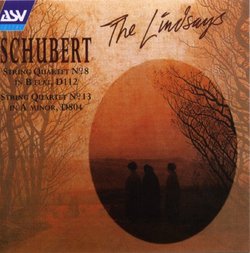| All Artists: Schubert, Lindsay String Quartet Title: String Quartets 8 & 13 Members Wishing: 0 Total Copies: 0 Label: Asv Living Era Release Date: 12/14/1993 Genre: Classical Style: Chamber Music Number of Discs: 1 SwapaCD Credits: 1 UPC: 743625059328 |
Search - Schubert, Lindsay String Quartet :: String Quartets 8 & 13
 | Schubert, Lindsay String Quartet String Quartets 8 & 13 Genre: Classical
|
Larger Image |
CD Details |
CD ReviewsTwo Very Different Quartets of Schubert in Fine Performances M. C. Passarella | Lawrenceville, GA | 07/27/2005 (5 out of 5 stars) "If you read a lot of music reviews, you probably know that the Lindsay Quartet is, for the most part, highly prized in its native England but doesn't fair so well among American critics. I don't know--when I hear their recordings I am neither moved to rhapsodizing nor to picky criticism. Their work seems mostly creditable to me. In this recording, I think the Lindsays achieve more than merely creditable results, however. To me, they capture perfectly the contrast between these two Schubert works, one a classic of the composer's maturity and the other probably the best of the quartets he produced as a remarkably gifted teenager.
The great Quartet D. 804 was written around the same time as the even finer D. 810, "Death and the Maiden," and while the latter is a whirlwind of tragic energy, D. 804 seems no less troubled. However, the tragic sense is subdued in D. 804, from the restless opening theme in the minor key to the strange, melancholy third movement minuet to the deceptively jolly rondo finale which, as the notes to this recording tell us, contains a "tempestuous" development section and contrasting episodes that are prevailingly serious rather than jolly. I'm tempted to think these quartets represent very different reactions to Schubert's awareness that his days were numbered. Indeed, he had a little over four years to live when he penned these two works. In contrast, the Quartet D. 112 is all youthful exuberance. Altogether, it is a lovely little work, but the last two movements are the most striking: a very Schubertian landler-like minuet with a gorgeous trio section and a juggernaut finale that, as the notes say, look forward to the bounding scherzo of Schubert's Great C Major Symphony. These two very different quartets make interesting discmates. The contrasts are eminently clear in the Lindsay's performances, which seem just about perfect to me in terms of pacing, intonation, ensemble. The recording that ASV provides can seem a trifle harsh; you might want to try a slight treble cut. Otherwise, it reproduces well the sound of a bright, lively auditorium. " |

 Track Listings (8) - Disc #1
Track Listings (8) - Disc #1